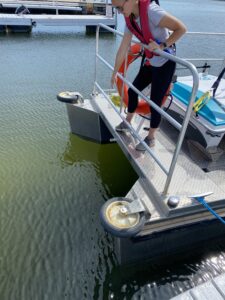Sara Pabich, a May 2022 UW-Madison graduate, spent summer 2022 interning with UW Oshkosh’s community embedded lab in Door County. She and six other students, from UW-Eau Claire, UW-Stout, UW-Oshkosh and Michigan Tech, were based in Baileys Harbor and worked on Wisconsin’s Beach Monitoring Program, monitoring the beaches for E. coli, a bacterium that indicates the presence of pathogens that can cause illness.
She also worked on the Marine Debris Mitigation Project, which involved using a boat and drones to collect trash from Sturgeon Bay and along the Fox River. The Door County Pulse featured Pabich in an article about the project. Read it at https://doorcountypulse.com/boat-helps-clear-the-waters-of-the-great-lakes/
Here’s what they had to say about their internship experiences.
Why did you want to work in Door County?
Pabich: As a local, I love the summers in Door County. I enjoy swimming along Lake Michigan, hiking, attending Northern Sky theater performances, and eating ice cream/custard throughout the county. Even in college, I would return to this beautiful place as often as possible.
What projects did you work on?
Pabich: The critical task of this internship was taking water samples at all the local beaches to ensure it is safe to swim. Therefore, I had several different beach routes. Additionally, this year UW-Oshkosh got a marine debris sea boat, which traveled to Manitowoc, Kewanee, Algoma, Green Bay and Sturgeon Bay Canal. My co-worker Nicole and I ran the Sturgeon Bay Canal route. Since this was the first year, our team explored different areas along the paths to see where marine debris could be collected.

I also did extensive water quality testing around Pilot Island. Unfortunately, birds have destroyed most of the vegetation on the island, and locals from Washington Island want to understand how the birds could also affect the water quality around the island. I helped take and analyze 42 samples around the island to understand the birds’ impact better.
What skills did you gain?
Pabich: I learned more about the process behind the scenes for the beach sampling. Often individuals ask me what the water quality is like, while I am taking a sample, without knowing that the analysis part happens at the lab. At the lab, we did a lot of measuring, used pipettors, kept detailed records of sampling, and did general quality control measures like ensuring our refrigerators and incubators were within the correct temperature ranges.
Regarding tactical skills, I got my boater’s safety license last spring and learned more boating skills. While backing up the trailer to launch the boat still proves to be a bit of a challenge, I have enjoyed being out on the water and learning more about the navigational markers.
Additionally, I think we learned about trial and error through this project. When we started this project, we did not know what general upkeep the new boat would require and where we could expect to find marine debris. For example, I remember one of our gas tanks running out while cruising along the shoreline, so we had to learn how to switch gas tanks on the water. Overall, this experience helped us build better problem solving skills.
What was your favorite part of this research experience?
Pabich: One of my favorite parts of this research experience was getting the chance to connect with different individuals throughout the county. I was interviewed by the Washington Island Observer and the Door County Pulse, which gave me the chance to interact with reporters. Additionally, through water quality testing on Washington Island and Pilot Island, I got to meet and know some locals on the island.
What career do you hope to go into after graduation? How will the skills you learned in this project help you attain your career goal?
Pabich: Overall, the projects I have worked on highlight the importance of the interaction between human health and the surrounding environment. For example, elevated levels of bacteria in the environment may mean closing a beach to avoid human health impacts. On the other hand, working on the marine debris sea boat, I have seen how humans can negatively impact the environment. My tactical skills and ability to see and learn how different systems interact will help me succeed in my graduate school program. [Pabich began graduate school at UW-Madison for Public Affairs and Public Health in fall 2022.]

